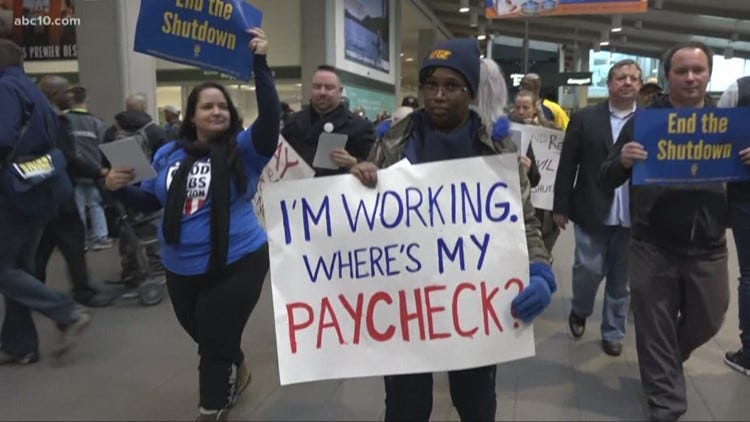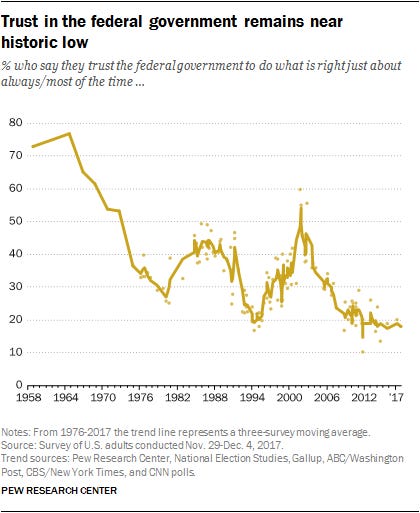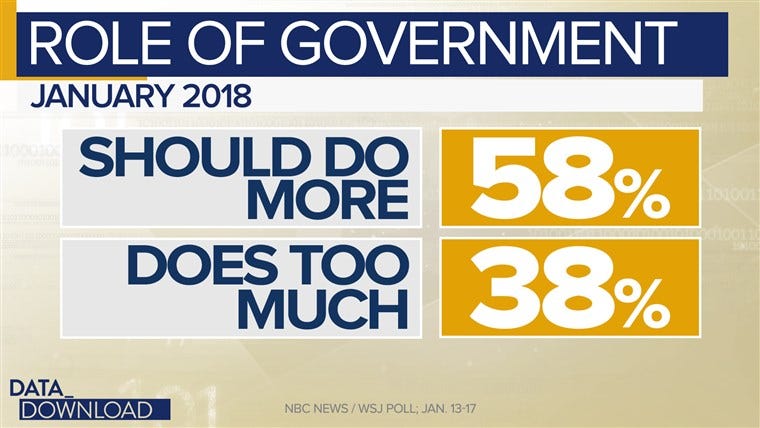#Slavery, Smaller Government & Public Distrust
A prolonged federal government shutdown creates subtle, but more devastating consequences

by Charles Ellison | Publisher’s Riff | @ellisonreport
Among the uglier, but still less reported or discussed aspects of the now month-long and way-too-long federal government shutdown are how it rattles and threatens to completely crack a fundamental pillar of civil U.S. society. With such a shutdown being a uniquely American experience (this doesn’t happen in any other advanced democracy or developed country), there is worry the public - while anxious - will adjust to it as a normal condition when, no, it’s not. When government ceases to function, and even when there is an organized front or movement instigating that dysfunction, that can be characterized as a form of coup, purging or, much worse, anarchy.
What’s also troubling is that this particular shutdown suggests we’re willing to consider acceptable paradigms: 1) slavery; 2) smaller government; and 3) very shaky public confidence in government. These three concepts are converging at this moment into a critical, sparky mass at a very fragile time for Americans.
Slavery By Any Other Name
The increasing number of federal government workers who are being called back to work while unpaid should be of great concern to everyone watching - and not just political junkies, insiders, policymakers and federal workers themselves. It’s casual treatment by mainstream media coverage is also troubling considering unpaid forced labor has traditionally been viewed as “slavery.” But no one is calling it that.
They should. It brings to question whether the public is fully aware of the definition of slavery and its history in the United States. Alarmingly, 41 percent of Americans, in a 2015 McClatchy-Marist poll are not aware that slavery was the main reason triggering the Civil War; 13 percent of voters, in a 2016 YouGov/Economist poll, disapproved of the freeing of slaves in 1863 - along with 19 percent of Republicans and conservatives. A Southern Poverty Law Center report in 2018 revealed only 8 percent of K-12 school students understood slavery as the cause of the Civil War and “fewer than half” could answer that it was legal in the American colonies. There may be some general view that slavery is wrong - but, how deep is the understanding of it?
Unpaid full-time work on any level should draw an immediately visceral reaction from the larger public. But even as it’s happening in plain view with furloughed workers being forced back into operation (or risk the loss of job), that reaction has not happened. A mix of flat growth (per EPI) in earnings for the bottom 90 percent, negative wage growth since the mid-90s, and declining union membership (from a high of nearly 34 percent in 1945 to now a low of just 11 percent in 2015) could be contributing to a perception that working more and earning less is not an unusual thing. This is all against the backdrop of a steady erosion of labor rights.
Keep in mind that tucked away, conveniently, from the official monthly unemployment numbers are the rising underemployment numbers.
That creates the slippery slope towards an is-what-it-is perception that it’s acceptable for people to work and not earn anything. Allowing policymakers to create such a condition is just short of condoning neo-slavery; letting that condition fester can also give the private sector (which is eager for more labor market deregulation) the signal that it’s acceptable behavior. Which means that, perhaps, it’s time for Americans to re-assess what they know and understand collectively about the history and basics of slavery before we end up repeating it in some form.
The “Smaller Government” Movement
Pushing the shutdown beyond a month or even into months begins fulfilling a long-held modern conservative view that “smaller government” is better government. Let the public become accustomed to the absence of key federal agencies and programs and, soon enough, the public will adapt to a world with “less government.” This religion went mainstream during the Reagan years, accelerated during the Republican “Contract with America” years and it was hypocritically defied by Republicans during the Bush II years as he radically re-altered and ballooned government in response to 9/11. Still, the trope of “smaller government” has been happily pushed since. And it’s, many suspect, quietly driving lack of Republican motivation to reopen the government in a bid to see how long the nation can do without certain functions. Simply put, it’s what they want anyway.
One could make the argument that a soft, bloodless and sophisticated purging of civil servants is taking place. Unpaid federal government workers are, understandably, re-considering the legendary stability of “good government jobs.” Hard choices are being made: from the dusting off of old resumes to look for other, more likely private sector, work to the fear that too much public protest over their predicament could cost them their current, furloughed jobs once and for all.
Too Few Americans Trust the Government
Public views on the government have never helped the federal worker cause. Trust in the federal government, as shown by Pew, has dropped to historic and dangerous lows …

A shutdown of this magnitude and length of time exacerbates that attitude. According to Gallup tracking, 48 percent and 54 percent of Americans, respectively, are described as having “not very much” trust and confidence or “none at all” in the federal government’s ability to respond to international and domestic crisis. And while there is a far greater percentage of Americans who view Congress unfavorably compared to federal workers …

The 29 percent who do view federal workers unfavorably seems within the range of Americans who either approve of Trump, the shutdown and blame Congressional Democrats for it. That’s still more than a quarter of Americans who don’t like federal workers, not including the nearly 10 percent who answered “don’t know” (a category which could easily fall into “unfavorable”). Meanwhile, 62 percent, in a 2018 Rasmussen poll, say government workers work much less harder than private sector workers (up from 57 percent in 2017), a signal - from a Republican-leaning pollster - that resentment towards federal workers may have increased over time.
Still, as an NBC/WSJ poll from a year ago showed: Americans want government doing more …



